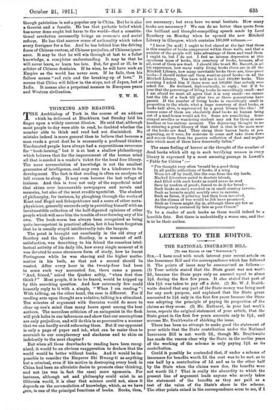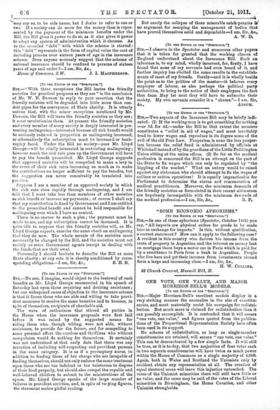LETTERS TO THE EDITOR.
THE NATIONAL INSURANCE BILL.
[To TER EDITOR OP TIER " EPECTATOR.1
Sin.,—I have read with much interest your recent article on the Insurance Bill and the correspondence which has followed it. The points of issue may be summarized as follows ;— (1) Your article stated that the State grant was not wort!) 2d., because the State pays only an amount equal to about lid. during the first few years. It also stated that part of this lid. was taken to pay off a debt. (2) Mr. W. J. Braith- waite denied that any part of the State money was being used for any such purpose, and explained that the State grant amounted to lid. only in the first few years because the State was adopting the principle of paying its proportion of the claims as they arose. (3) Mr. Bathurst, in your last week's issue, repeats the original statement of your article, that the State grant in the first few years amounts only to lid., and accuses Mr. Braithwaite of shirking the issue.
There has been no attempt to make good the statement of your article that the State contribution under the National Insurance Bill is not worth 2d., though Mr. Braithwaite has made the reason clear why the State in the earlier years of the working of the scheme is only paying lid. as its contribution.
Could it possibly be contended that, if under a scheme of insurance for benefits worth 2d. the cost was to be met, as to one half by a contribution of Id. and as to the other half by the State when the claims were due, the benefits were not worth 2d. P That is really the absurdity to which the present line of argument leads anyone who merely takes the statement of the benefits as they are paid as a test of the value of the State's share in the scheme. The other points raised in the correspondence seem to me, if may say so, to be side issues, but I desire to refer to one or two. If a society can do more for the money than is repre- sented by the payment of the minimum benefits under the Bill, the Bill gives it rower to do so, as it also gives it power to adopt any system of administration which it chooses. As to the so-called "debt" with which the scheme is started: this " debt " represents in the form of capital value the cost of including persons over sixteen years of age in the insurance scheme. Does anyone seriously suggest that the scheme of national insurance should be confined to persons of sixteen years of age and under P—I am, Sir, &c.,















































 Previous page
Previous page